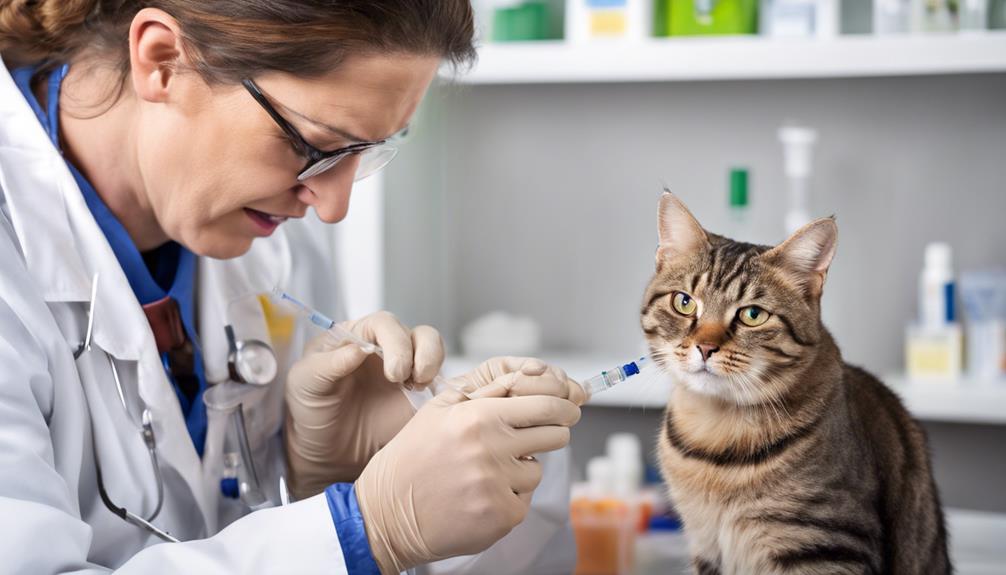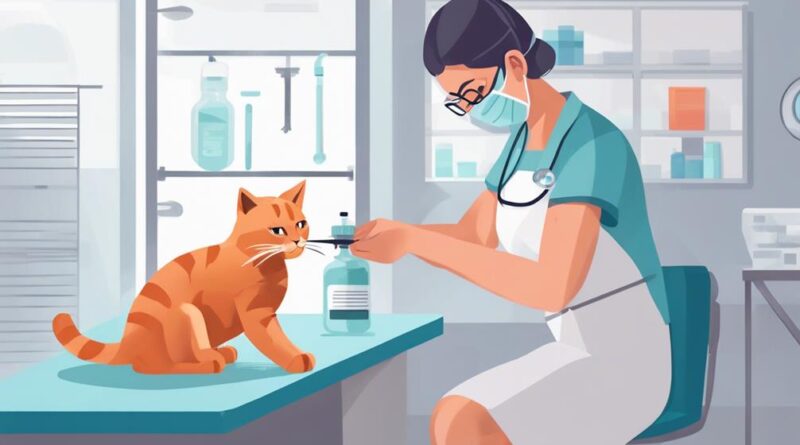Your Guide to Feline Herpesvirus Vaccination
You may have heard about the importance of keeping your feline friend protected, especially when it comes to health concerns.
When it comes to feline herpesvirus vaccination, there are key considerations you need to be aware of to ensure the well-being of your beloved cat.
Understanding the effectiveness and potential risks associated with this vaccine is crucial for making informed decisions about your cat's healthcare.
Stay tuned to discover how you can navigate through the world of feline herpesvirus vaccination and safeguard your cat's health.
Understanding Feline Herpesvirus
To understand Feline Herpesvirus, you must grasp its impact on cats' respiratory systems. This virus, also known as FHV-1, is highly contagious among cats and affects the upper respiratory tract, leading to symptoms like sneezing, nasal discharge, and eye ulcers. Transmission methods for Feline Herpesvirus include direct contact with an infected cat's saliva, nasal discharge, or ocular secretions. Additionally, indirect transmission can occur through contaminated objects such as food and water bowls, grooming tools, or bedding.
Prevention strategies play a crucial role in managing Feline Herpesvirus. One key method is to isolate infected cats from healthy ones to prevent the spread of the virus. Regular cleaning and disinfection of common areas and objects can also help reduce the risk of transmission. Ensuring all cats in multi-cat households are vaccinated against FHV-1 is another important prevention strategy. Vaccination can help reduce the severity of symptoms and the likelihood of spreading the virus to other cats.
Importance of Vaccinating Cats
Understanding the impact of Feline Herpesvirus on cats' respiratory systems emphasizes the importance of vaccinating your feline companions against this contagious virus. Feline Herpesvirus, also known as Feline Viral Rhinotracheitis, can cause severe respiratory issues, ocular symptoms, and weaken your cat's immune system. By vaccinating your cats, you play a crucial role in protecting them from this potentially debilitating disease.
Importance of Vaccinating Cats:
- Preventative Care: Vaccinating your cats against Feline Herpesvirus is a key component of preventative care. It helps reduce the risk of your feline friends contracting the virus and experiencing its associated symptoms.
- Immunization Benefits: Vaccination boosts your cat's immune system, enabling it to effectively fight off the virus if exposed. This leads to a decreased likelihood of severe illness and complications from Feline Herpesvirus infection.
- Protecting Vulnerable Cats: Vaccinating your cats not only safeguards their health but also helps in preventing the spread of the virus to other susceptible felines in your community. It contributes to creating a healthier environment for all cats.
Vaccine Schedule for Cats
Regularly scheduling vaccinations is crucial for maintaining your cat's immunity against Feline Herpesvirus and other preventable diseases. Following a proper vaccine schedule is essential in providing your feline friend with the necessary preventative measures to keep them healthy and protected.
The vaccine schedule for cats typically starts when they're kittens, usually around 8-9 weeks of age. At this stage, your cat will receive a series of vaccinations to kickstart their immune response against various diseases, including Feline Herpesvirus. These initial vaccines are crucial in building a strong foundation for your cat's immune system to effectively combat potential infections.
As your cat grows, booster shots will be required to ensure their immunity remains at optimal levels. Booster shots are necessary because the immunity provided by vaccines can decrease over time. By adhering to the recommended vaccine schedule, you can help strengthen your cat's immune response and provide them with ongoing protection against Feline Herpesvirus and other harmful pathogens.
Consulting with your veterinarian is essential to tailor a vaccine schedule that suits your cat's specific needs based on factors like age, lifestyle, and overall health. By staying up to date with vaccinations and following the appropriate schedule, you can significantly reduce the risk of your cat contracting preventable diseases like Feline Herpesvirus.
Side Effects and Risks
When vaccinating your cat against Feline Herpesvirus, be aware of potential side effects and risks that may arise. While vaccines are crucial in protecting your feline friend, they can sometimes have adverse effects. Here's what you should know:
- Vaccine effectiveness: Feline Herpesvirus vaccines are generally considered safe and effective. They help prevent your cat from contracting the virus and reduce the severity of symptoms if they do become infected. However, no vaccine is 100% effective, so there's still a small chance that your cat could develop the virus despite being vaccinated. It's essential to discuss the effectiveness of the vaccine with your veterinarian to understand the level of protection it provides.
- Long term immunity: Vaccines for Feline Herpesvirus can provide long-lasting immunity, but this immunity may wane over time. Some cats may require booster shots to maintain adequate protection against the virus. Regular check-ups with your veterinarian can help determine if your cat needs additional vaccinations to ensure continuous immunity. Monitoring your cat's immunity levels is crucial for their overall health and well-being.
Boosters and Follow-Up
To maintain your cat's immunity against Feline Herpesvirus, booster shots and follow-up vaccinations may be necessary. These additional doses help reinforce your cat's immune response, ensuring that they've long term protection against the virus.
After the initial vaccination series, booster shots are typically recommended to provide continued immunity. The timing of these boosters can vary depending on the specific vaccine used, so it's essential to follow your veterinarian's recommendations for the best protection. By receiving these booster shots, your cat's immune system will be reminded of how to fight off the virus, enhancing their defenses over time.
Follow-up vaccinations play a crucial role in maintaining your cat's immunity at optimal levels. Regular check-ups with your veterinarian will allow them to assess your cat's immune response and determine if additional vaccinations are needed. These follow-up vaccinations are vital in ensuring that your cat continues to have robust protection against Feline Herpesvirus.
Herd Immunity in Cats
Maintaining herd immunity in cats involves ensuring that not only your own cat but also the feline community as a whole is protected against Feline Herpesvirus. By vaccinating your cat and contributing to community protection, you play a crucial role in preventing the spread of the virus and reducing the overall prevalence of the disease.
Key Points for Herd Immunity in Cats:
- Community Protection: Vaccinating your cat not only shields them from the virus but also helps create a barrier of immunity within the feline population. This collective defense is vital in safeguarding vulnerable cats who may not be able to receive the vaccine.
- Epidemiology Insights: Understanding the transmission dynamics and prevalence of Feline Herpesvirus in your area can guide vaccination efforts. By participating in herd immunity, you contribute to the overall health and well-being of the feline community.
- Reducing Disease Spread: Herd immunity limits the transmission of the virus, making it harder for Feline Herpesvirus to spread among cats. This decreased transmission ultimately lowers the risk of outbreaks and protects cats at a population level.
Tips for Vaccine Administration

For successful vaccine administration in cats, ensure proper handling and storage of the vaccines. Proper technique is crucial to guarantee the effectiveness of the feline herpesvirus vaccination. When administering the vaccine, follow these prevention tips to ensure your cat receives the full benefit of the immunization.
Firstly, always check the vaccine's expiration date before administering it to your cat. Using an expired vaccine can be ineffective or even harmful to your cat's health. Additionally, make sure to store the vaccine according to the manufacturer's instructions. Improper storage can render the vaccine ineffective, leading to a wasted effort in protecting your cat against feline herpesvirus.
When administering the vaccine, use a clean and sterile syringe for each injection. Proper technique involves injecting the vaccine into the appropriate site, usually the scruff of the neck or the thigh muscle. Avoid injecting the vaccine into the blood vessels, as this can reduce its effectiveness.
After vaccination, monitor your cat for any adverse reactions. While rare, some cats may experience mild side effects such as lethargy or a slight fever. If you notice any concerning symptoms, contact your veterinarian immediately.
Consulting Your Vet
Consider scheduling a consultation with your veterinarian to discuss the best course of action for your cat's feline herpesvirus vaccination. Your vet can provide valuable insights and recommendations tailored to your cat's specific needs. Here are some key points to keep in mind when consulting your vet:
- Vet Recommendations: Your veterinarian will be able to assess your cat's health status and any potential risks associated with feline herpesvirus. They can recommend the most suitable vaccination schedule based on factors such as your cat's age, lifestyle, and overall health. Trusting your vet's expertise is crucial in ensuring your cat receives the best possible care.
- Concerns: If you have any concerns about feline herpesvirus vaccination, such as potential side effects or the necessity of the vaccine, don't hesitate to discuss them with your vet. They can address your worries and provide you with accurate information to help you make an informed decision.
- Cat Health and Prevention: Vaccination plays a vital role in preventing feline herpesvirus and its associated complications. By following your vet's recommendations and staying up to date with your cat's vaccinations, you're taking proactive steps to safeguard your cat's health and well-being.
Consulting your vet is an essential step in ensuring your cat receives the necessary protection against feline herpesvirus. Prioritize your cat's health by seeking guidance from your veterinarian on the best vaccination approach.
Frequently Asked Questions
Can Feline Herpesvirus Be Transmitted to Humans?
Feline herpesvirus can't be transmitted to humans, so you don't need to worry about catching it from your cat.
However, it's still essential to take precautions to keep your furry friend healthy. By following proper hygiene practices and regularly vaccinating your cat against feline herpesvirus, you can prevent zoonotic risks and ensure your pet's well-being.
Is There a Difference in Vaccine Effectiveness for Indoor Versus Outdoor Cats?
When it comes to vaccine effectiveness for indoor versus outdoor cats, the duration of vaccination and immune response can vary. Outdoor cats may be exposed to more pathogens, requiring a stronger immune response. Vaccination duration might need to be more frequent for outdoor cats to maintain protection.
Indoor cats may have less exposure, but regular vaccination is still crucial to ensure their immune system is primed against feline herpesvirus.
Are There Any Alternative Treatment Options for Feline Herpesvirus Besides Vaccination?
When it comes to feline herpesvirus, there are alternative therapies and home remedies that can help manage symptoms besides vaccination. Some options include L-lysine supplements, immune-boosting supplements, and keeping stress levels low. Additionally, proper nutrition and a calm environment can aid in supporting your cat's immune system to combat the virus effectively.
Always consult with your veterinarian to determine the best treatment plan for your feline friend.
Can Cats Still Contract Feline Herpesvirus After Being Vaccinated?
Yes, cats can still contract feline herpesvirus after being vaccinated. Vaccination helps boost their immune system to fight off the virus, but it's not a 100% guarantee.
Natural remedies can also support their immune system in combating the virus.
Keep an eye on any symptoms and consult your vet for the best course of action to manage feline herpesvirus in your cat.
Are There Any Long-Term Effects of Feline Herpesvirus Vaccination on a Cat's Health?
Long-term implications of feline herpesvirus vaccination on a cat's health can be minimal. Some cats may experience mild side effects like soreness or lethargy, but these usually resolve quickly.
Health concerns are rare, but always monitor your cat post-vaccination. If you notice any unusual symptoms, contact your vet.
Conclusion
Now that you know the importance of vaccinating your cat against feline herpesvirus, make sure to follow the recommended vaccine schedule and consult your vet for any concerns.
By staying up-to-date on vaccinations, you can help protect your feline friend and contribute to herd immunity in your community.
Remember, a healthy cat is a happy cat!
